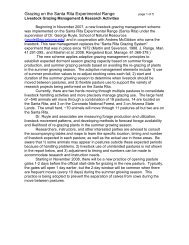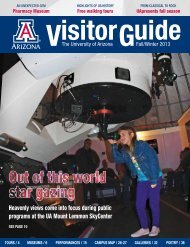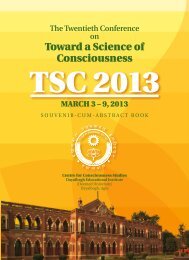CONSCIOUSNESS
Download - Center for Consciousness Studies - University of Arizona
Download - Center for Consciousness Studies - University of Arizona
- No tags were found...
You also want an ePaper? Increase the reach of your titles
YUMPU automatically turns print PDFs into web optimized ePapers that Google loves.
50 1. Philosophy<br />
for Jackson to show that one must choose between physicalism and phenomenal realism, he<br />
must show that there is a salient difference between how biological and phenomenological<br />
properties relate to microphysics. And this, it seems, cannot be done. P7<br />
19 Taking the Edge Off Type-A Materialism Brian Fiala <br />
(Philosophy, University of Arizona, Tucson, AZ)<br />
Type-A materialism is the view that consciousness can be explained exclusively by explaining<br />
various functions. According to Chalmers, ‘’the most interesting arguments for type-<br />
A materialism are those that argue that we can give a physical explanation of our beliefs<br />
about consciousness, such as the belief that we are conscious, the belief that consciousness<br />
is a further explanandum, and the belief that consciousness is nonphysical’’ (2002: 253). He<br />
also claims that ‘’at a certain point, the debate between type-A materialists and their opponents<br />
usually comes down to intuition: most centrally, the intuition that consciousness (in a<br />
nonfunctionally defined sense) exists, or that there is something that needs to be explained<br />
(over and above explaining the functions)’’ (253). Because anti-materialist intuitions are so<br />
powerful, the result is that ‘’even among materialists, type-A materialists are a distinct minority’’<br />
(253). The charge is essentially that type-A materialism presents itself as a radical view<br />
because it does not take seriously that which appears to be intuitively undeniable about consciousness.<br />
But, I claim, this shortcoming is not a necessary feature of the view. By explaining<br />
key anti-materialist beliefs, a type-A materialist can produce positive arguments for the view<br />
while simultaneously rendering it significantly less radical. For example, a type-A materialist<br />
who offers a robust functional explanation of the intuition that consciousness is a ‘further explanandum’<br />
takes that intuition quite seriously, even though such a materialist clearly does not<br />
take the intuition at face value. Since this sort of materialist has in hand an adequate explanation<br />
of one his opponent’s key intuitions, it would be unfair to accuse the materialist of simply<br />
‘intuition mongering.’ I argue that an especially important group of beliefs about consciousness<br />
includes those beliefs that are manifested in our intuitive judgments about consciousness,<br />
particularly intuitive judgments that are leveraged in philosophical arguments about the nature<br />
of consciousness. I suggest that the tools of cognitive science and experimental philosophy<br />
provide a promising avenue for explaining these intuitive beliefs. I briefly sketch some ways<br />
in which we might use these tools to functionally explain the intuition that consciousness is<br />
not physically explicable. C2<br />
20 Beauregard and the “New” Dualism: An Emergentist Response Mathew Gendle,<br />
Jeffrey C. Pugh, Department of Religious Studies, Elon University <br />
(Psychology, Elon University, Elon, NC)<br />
In their book “The Spiritual Brain: A Neuroscientist’s Case for the Existence of the Soul”<br />
(2007), Mario Beauregard and Denyse O’Leary outline arguments supporting non-materialist<br />
neuroscience approaches to the understanding of spiritual experiences and consciousness.<br />
This work dismisses the physicalist thinking championed by many mainstream scientists and<br />
philosophers, and stokes the debate between materialism and dualism. Although the authors<br />
present an excellent argument for why materialism cannot fully explain human consciousness<br />
and many spiritual experiences, their work fails to make a convincing case that Cartesian<br />
dualism possesses explanatory power beyond that provided by physicalism. By focusing on<br />
the dichotomy between materialism and dualism, Beauregard and O’Leary have overlooked<br />
a viable third alternative: emergence. As discussed by Clayton (2004) and Peterson (2006),<br />
radical emergence provides more satisfying explanations for the range of mental and spiritual<br />
phenomena studied by Beauregard and colleagues. Radical emergence is compatible with<br />
both the claim that mental states arise from physical substrates and the position that mental<br />
phenomena are not wholly reducible to embodied biological activity. In this presentation, we<br />
will review the principle claims outlined in “The Spiritual Brain”, critique the authors’ nonmaterialist<br />
position in regards to these claims, and re-examine these points through the lens<br />
of radical emergence. P1







